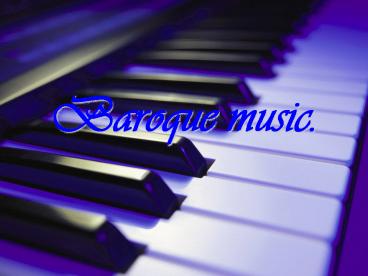Baroque music. - PowerPoint PPT Presentation
Title:
Baroque music.
Description:
Baroque music. Baroque music describes a style of European classical music approximately extending from 1600 to 1750. This era is said to begin in music after the ... – PowerPoint PPT presentation
Number of Views:198
Avg rating:3.0/5.0
Title: Baroque music.
1
Baroque music.
2
(No Transcript)
3
- Baroque music describes a style of European
classical music approximately extending from 1600
to 1750. This era is said to begin in music after
the Renaissance and was followed by the Classical
era. The word "baroque" came from the Portuguese
word barroco, meaning "misshapen pearl", a
strikingly fitting characterization of the
architecture of this period later, the name came
to be applied also to its music. Baroque music
forms a major portion of the classical music
canon, being widely studied, performed, and
listened to. It is associated with composers such
as Johann Sebastian Bach, George Frideric Handel,
Alessandro Scarlatti, Antonio Vivaldi,
Jean-Baptiste Lully, Arcangelo Corelli, Claudio
Monteverdi, Jean-Philippe Rameau and Henry
Purcell. The baroque period saw the development
of functional tonality. During the period,
composers and performers used more elaborate
musical ornamentation, made changes in musical
notation, and developed new instrumental playing
techniques. Baroque music expanded the size,
range, and complexity of instrumental
performance, and also established opera as a
musical genre. Many musical terms and concepts
from this era are still in use today.
4
Genres
- Baroque composers wrote in many different musical
genres. Opera, invented in the transitional
period between the late Renaissance and early
Baroque, became an important musical form during
the Baroque, with the operas of Alessandro
Scarlatti, Handel, and others. The oratorio
achieved its peak in the work of Bach and Handel
opera and oratorio often used very similar music
forms, such as a widespread use of the da capo
aria. - In other religious music, the Mass and motet
receded slightly in importance, but the cantata
flourished in the work of Bach and other
Protestant composers. Virtuoso organ music also
flourished, with toccatas, fugues, and other
works. - Instrumental sonatas and dance suites were
written for individual instruments, for chamber
groups, and for (small) orchestra. The concerto
emerged, both in its form for a single soloist
plus orchestra and as the concerto grosso, in
which a small group of soloists is contrasted
with the full ensemble. The French overture, with
its contrasting slow and fast sections, added
grandeur to the many courts at which it was
performed. - Keyboard works were sometimes written largely for
the pleasure and instruction of the performer.
These included a series of works by the mature
Bach that are widely considered to be the
intellectual culmination of the Baroque era the
Well-Tempered Clavier, the Goldberg Variations,
and The Art of Fugue.
5
- Vocal
- Opera
- Zarzuela
- Opera seria
- Opera comique
- Opera-ballet
- Masque
- Oratorio
- Passion (music)
- Cantata
- Mass (music)
- Anthem
- Monody
- Chorale
- Instrumental
- Concerto grosso
- Fugue
- Suite
- Allemande
- Courante
- Sarabande
- Gigue
- Gavotte
- Minuet
- Sonata
- Sonata da camera
- Sonata da chiesa
- Trio sonata
- Partita
- Canzona
- Sinfonia
- Fantasia
6
(No Transcript)
7
Antonio Vivaldi
- Antonio Lucio Vivaldi (March 4, 1678 July 28,
1741), nicknamed il Prete Rosso ("The Red
Priest") was an Italian Baroque composer, priest,
and virtuoso violinist, born in Venice. Vivaldi
is recognized as one of the greatest Baroque
composers, and his influence during his lifetime
was widespread over Europe. Vivaldi is known
mainly for composing instrumental concertos,
especially for the violin, as well as sacred
choral works and over 40 operas. His best known
work is a series of violin concertos known as The
Four Seasons. - Many of his compositions were written for the
female music ensemble of the Ospedale della
Pietà, an orphanage for poor and illegitimate
children where Vivaldi worked between 1703 and
1740. Vivaldi also had some success with stagings
of his operas in Venice, Mantua and Vienna. After
meeting the Emperor Charles VI, Vivaldi moved to
Vienna hoping for preferment. The Emperor died
soon after Vivaldi's arrival, and the composer
died a pauper, without a steady source of income.
8
George Frideric Handel
- George Frideric Handel (German Georg Friedrich
Händel pronounced ) (23 February 1685 14 April
1759) was a German-British Baroque composer who
is famous for his operas, oratorios, and
concertos. Handel was born in Germany in the same
year as Johann Sebastian Bach and Domenico
Scarlatti. He received critical musical training
in Italy before settling in London and becoming a
naturalised British subject. His works include
Messiah, Water Music, and Music for the Royal
Fireworks. He was strongly influenced by the
techniques of the great composers of the Italian
Baroque and the middle-German polyphonic Choral
tradition. Handel's music was well-known to many
composers, including Haydn, Mozart, and
Beethoven.































